UCP600的中英文版下载
UCP600(中英文)

《跟单信用证统一惯例》1(UCP600)(ICC Uniform Customs and Practice for Documentary Credits)Article 1 Application of UCPThe Uniform Customs and Practice for Documentary Credits, 2007 Revision, ICC Publication no. 600 (“UCP”) are rules that apply to any documentary credit (“credit”) (including, to the extent to which they may be applicable, any standby letter of credit) when the text of the credit expressly indicates that it is subject to these rules. They are binding on all parties thereto unless expressly modified or excluded by the credit.第1条UCP的适用范围《跟单信用证统一惯例》(2007年修订版,国际商会第600号出版物,简称“UCP”)在信用证条文明确表明其将受该规则约束的情况下,适用于所有跟单信用证(以下称“信用证”)(在其可适用的范围内,包括备用信用证)。
除非信用证明确地修改或排除,本规则对信用证所有各有关方均有约束力。
Article 2 DefinitionsFor the purpose of these rules:Advising bank means the bank that advises the credit at the request of the issuing bank.Applicant means the party on whose request the credit is issued.Banking day means a day on which a bank is regularly open at the place at which an act subject to these rules is to be performed.Beneficiary means the party in whose favour a credit is issued.Complying presentation means a presentation that is in accordance with the terms and conditions of the credit, the applicable provisions of these rules and international standard banking practice. Confirmation means a definite undertaking of the confirming bank, in addition to that of the issuing bank, to honour or negotiate a complying presentation.Confirming bank means the bank that adds its confirmation to a credit upon the issuing bank’s authorization or request.Credit means any arrangement, however named or described, that is irrevocable and thereby constitutes a definite undertaking of the issuing bank to honour a complying presentation.Honour means:a. to pay at sight if the credit is available by sight payment.1本中译本由姚新超根据UCP600英文版整理而成,并非正式译文,仅供学习和参考之用。
UCP600中英文对照版

《跟单信用证统一惯例》(UCP600)中英文对照版Article 1 Application of UCP第一条统一惯例的适用范围The Uniform Customs and Practice for Documentary Credits, 2007 Revis ion, ICC Publication no. 600 (“UCP”) are rules that apply to any do cumentary credit (“credit”) (including, to the extent to which they may be applicable, any standby letter of credit) when the text of t he credit expressly indicates that it is subject to these rules. The y are binding on all parties thereto unless expressly modified or ex cluded by the credit.跟单信用证统一惯例,2007年修订本,国际商会第600号出版物,适用于所有在正文中标明按本惯例办理的跟单信用证(包括本惯例适用范围内的备用信用证)。
除非信用证中另有规定,本惯例对一切有关当事人均具有约束力。
Article 2 Definitions第二条定义For the purpose of these rules:就本惯例而言:Advising bank means the bank that advises the credit at the request of the issuing bank.通知行意指应开证行要求通知信用证的银行。
Applicant means the party on whose request the credit is issued.申请人意指发出开立信用证申请的一方。
《跟单信用证统一惯例UCP600》中英对照共75页word资料

《跟单信用证统一惯例(UCP600)》(中英对照版)作者:国际商会易水寒译阅读2912次更新时间:2007-3-29《跟单信用证统一惯例(UCP600)》Article 1 Application of UCP第一条统一惯例的适用范围The Uniform Customs and Practice for Documentary Credits, 2007 Revision, ICC Publication no. 600 (“UCP”) are rules that apply to any documentary credit (“credit”) (including, to the extent to which they may be applicable, any standby letter of credit) when the text of the credit expressly indicates that it is subject to these rules. They are binding on all parties thereto unless expressly modified or excluded by the credit.跟单信用证统一惯例,2007年修订本,国际商会第600号出版物,适用于所有在正文中标明按本惯例办理的跟单信用证(包括本惯例适用范围内的备用信用证)。
除非信用证中另有规定,本惯例对一切有关当事人均具有约束力。
Article 2 Definitions第二条定义For the purpose of these rules:就本惯例而言:Advising bank means the bank that advises the credit at the request of the issuing bank.通知行意指应开证行要求通知信用证的银行。
UCP600信用证中英文版

ICC UNIFORM CUSTOMS AND PRACTICE FOR DOCUMENTARYCREDITSUCP 600英文FOREWORDINTRODUCTIONARTICLE 1 APPLICATION OF UCPARTICLE 2 DEFINITIONSARTICLE 3 INTERPRETATIONSARTICLE 4 CREDITS V. CONTRACTSARTICLE 5 DOCUMENTS V. GOODS, SERVICES OR PERFORMANCEARTICLE 6 AVAILABILITY, EXPIRY DATE AND PLACE FOR PRESENTATIONARTICLE 7 ISSUING BANK UNDERTAKINGARTICLE 8 CONFIRMING BANK UNDERTAKINGARTICLE 9 ADVISING OF CREDITS AND AMENDMENTS ARTICLE 10 AMENDMENTSARTICLE 11 TELETRANSMITTED AND PRE-ADVISED CREDITS AND AMENDMENTSARTICLE 12 NOMINATIONARTICLE 13 BANK-TO-BANK REIMBURSEMENT ARRANGEMENTSARTICLE 14 STANDARD FOR EXAMINATION OF DOCUMENTSARTICLE 15 COMPLYING PRESENTATIONARTICLE 16 DISCREPANT DOCUMENTS, WAIVER AND NOTICE ARTICLE 17 ORIGINAL DOCUMENTS AND COPIESARTICLE 18 COMMERCIAL INVOICEARTICLE 19 TRANSPORT DOCUMENT COVERING AT LEAST TWO DIFFERENT MODES OF TRANSPORTARTICLE 20 BILL OF LADINGARTICLE 21 NON-NEGOTIABLE SEA WAYBILLARTICLE 22 CHARTER PARTY BILL OF LADINGARTICLE 23 AIR TRANSPORT DOCUMENTARTICLE 24 ROAD, RAIL OR INLAND WATERWAY TRANSPORT DOCUMENTSARTICLE 25 COURIER RECEIPT, POST RECEIPT OR CERTIFICATE OF POSTINGARTICLE 26 "ON DECK", "SHIPPER'S LOAD AND COUNT",“SAID BY SHIPPER TO CONTAIN”AND CHARGES ADDITIONAL TO FREIGHTARTICLE 27 CLEAN TRANSPORT DOCUMENTARTICLE 28 INSURANCE DOCUMENT AND COVERAGE ARTICLE 29 EXTENSION OF EXPIRY DATE OR LAST DAY FOR PRESENTATIONARTICLE 30 TOLERANCE IN CREDIT AMOUNT, QUANTITY AND UNIT PRICESARTICLE 31 PARTIAL DRAWINGS OR SHIPMENTSARTICLE 32 INSTALMENT DRAWINGS OR SHIPMENTS ARTICLE 33 HOURS OF PRESENTATIONARTICLE 34 DISCLAIMER ON EFFECTIVENESS OF DOCUMENTS ARTICLE 35 DISCLAIMER ON TRANSMISSION AND TRANSLATIONARTICLE 36 FORCE MAJEUREARTICLE 37 DISCLAIMER FOR ACTS OF AN INSTRUCTED PARTYARTICLE 38 TRANSFERABLE CREDITSARTICLE 39 ASSIGNMENT OF PROCEEDSUCP600中文版UCP600第一条 UCP的适用范围第二条定义第三条解释第四条信用证与合同第五条单据与货物、服务或履约行为第六条兑用方式、截止日和交单地点第七条开证行责任第八条保兑行责任第九条信用证及其修改的通知第十条修改第十一条电讯传输的和预先通知的信用证和修改第十二条指定第十三条银行之间的偿付安排第十四条单据审核标准第十五条相符交单第十六条不符单据、放弃及通知第十七条正本单据及副本第十八条商业发票第十九条涵盖至少两种不同运输方式的运输单据第二十条提单第二十一条不可转让的海运单第二十二条租船合同提单第二十三条空运单据第二十四条公路、铁路或内陆水运单据第二十五条快递收据、邮政收据或投邮证明第二十六条 “货装舱面”、“托运人装载和计数”、“内容据托运人报称”及运费之外的费用。
UCP600中英对照
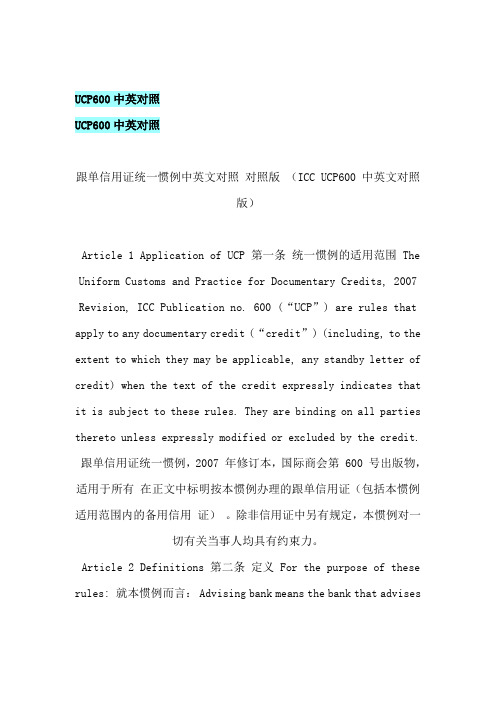
UCP600中英对照UCP600中英对照跟单信用证统一惯例中英文对照对照版(ICC UCP600 中英文对照版)Article 1 Application of UCP 第一条统一惯例的适用范围 The Uniform Customs and Practice for Documentary Credits, 2007 Revision, ICC Publication no. 600 (“UCP”) are rules that apply to any documentary credit (“credit”) (including, to the extent to which they may be applicable, any standby letter of credit) when the text of the credit expressly indicates that it is subject to these rules. They are binding on all parties thereto unless expressly modified or excluded by the credit. 跟单信用证统一惯例,2007 年修订本,国际商会第 600 号出版物,适用于所有在正文中标明按本惯例办理的跟单信用证(包括本惯例适用范围内的备用信用证)。
除非信用证中另有规定,本惯例对一切有关当事人均具有约束力。
Article 2 Definitions 第二条定义 For the purpose of these rules: 就本惯例而言: Advising bank means the bank that advisesthe credit at the request of the issuing bank. 通知行意指应开证行要求通知信用证的银行。
Applicant means the party on whose request the credit is issued. 申请人意指发出开立信用证申请的一方。
《跟单信用证统一惯例(UCP600)》中英文对照版6
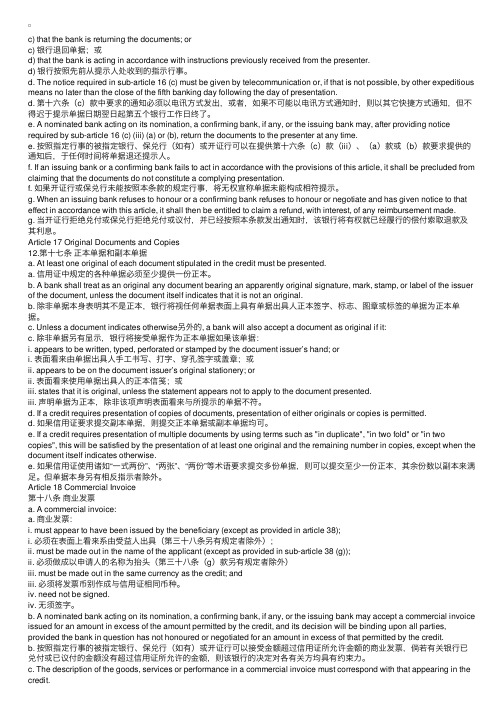
c) that the bank is returning the documents; orc) 银⾏退回单据;或d) that the bank is acting in accordance with instructions previously received from the presenter.d) 银⾏按照先前从提⽰⼈处收到的指⽰⾏事。
d. The notice required in sub-article 16 (c) must be given by telecommunication or, if that is not possible, by other expeditious means no later than the close of the fifth banking day following the day of presentation.d. 第⼗六条(c)款中要求的通知必须以电讯⽅式发出,或者,如果不可能以电讯⽅式通知时,则以其它快捷⽅式通知,但不得迟于提⽰单据⽇期翌⽇起第五个银⾏⼯作⽇终了。
e. A nominated bank acting on its nomination, a confirming bank, if any, or the issuing bank may, after providing notice required by sub-article 16 (c) (iii) (a) or (b), return the documents to the presenter at any time.e. 按照指定⾏事的被指定银⾏、保兑⾏(如有)或开证⾏可以在提供第⼗六条(c)款(iii)、(a)款或(b)款要求提供的通知后,于任何时间将单据退还提⽰⼈。
f. If an issuing bank or a confirming bank fails to act in accordance with the provisions of this article, it shall be precluded from claiming that the documents do not constitute a complying presentation.f. 如果开证⾏或保兑⾏未能按照本条款的规定⾏事,将⽆权宣称单据未能构成相符提⽰。
UCP600中英文对照版.pdf

UCP600中英文对照版.pdf《跟单信用证统一惯例》(UCP600)中英文对照版Article 1 Application of UCP第一条统一惯例的适用范围The Uniform Customs and Practice for Documentary Credits, 2007 Revis ion, ICC Publication no. 600 (“UCP”) are rules that apply to any do cumentary credit (“credit”) (including, to the extent to which they may be applicable, any standby letter of credit) when the text of t he credit expressly indicates that it is subject to these rules. The y are binding on all parties thereto unless expressly modified or ex cluded by the credit.跟单信用证统一惯例,2007年修订本,国际商会第600号出版物,适用于所有在正文中标明按本惯例办理的跟单信用证(包括本惯例适用范围内的备用信用证)。
除非信用证中另有规定,本惯例对一切有关当事人均具有约束力。
Article 2 Definitions第二条定义For the purpose of these rules:就本惯例而言:Advising bank means the bank that advises the credit at the request of the issuing bank.通知行意指应开证行要求通知信用证的银行。
Applicant means the party on whose request the credit is issued.申请人意指发出开立信用证申请的一方。
ICC UCP600中英文对照版
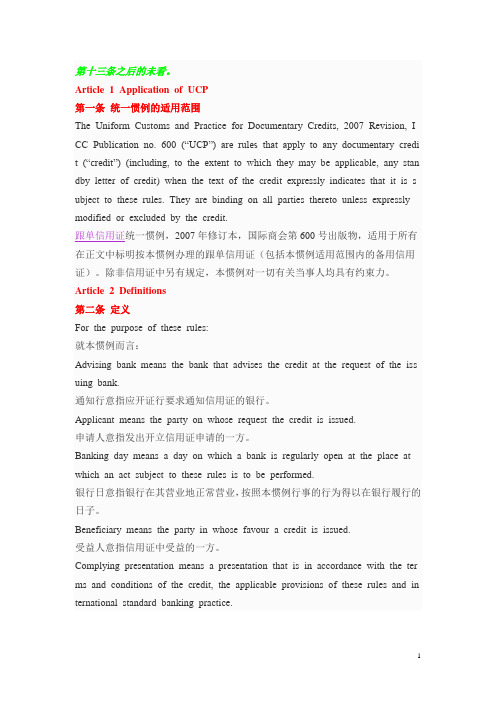
第十三条之后的未看。
Article 1 Application of UCP第一条统一惯例的适用范围The Uniform Customs and Practice for Documentary Credits, 2007 Revision, I CC Publication no. 600 (“UCP”) are rules that apply to any documentary credi t (“credit”) (including, to the extent to which the y may be applicable, any stan dby letter of credit) when the text of the credit expressly indicates that it is s ubject to these rules. They are binding on all parties thereto unless expressly modified or excluded by the credit.跟单信用证统一惯例,2007年修订本,国际商会第600号出版物,适用于所有在正文中标明按本惯例办理的跟单信用证(包括本惯例适用范围内的备用信用证)。
除非信用证中另有规定,本惯例对一切有关当事人均具有约束力。
Article 2 Definitions第二条定义For the purpose of these rules:就本惯例而言:Advising bank means the bank that advises the credit at the request of the iss uing bank.通知行意指应开证行要求通知信用证的银行。
Applicant means the party on whose request the credit is issued.申请人意指发出开立信用证申请的一方。
《跟单信用证统一惯例》(UCP600)中英文对照版-Application of UCP【圣才出品】
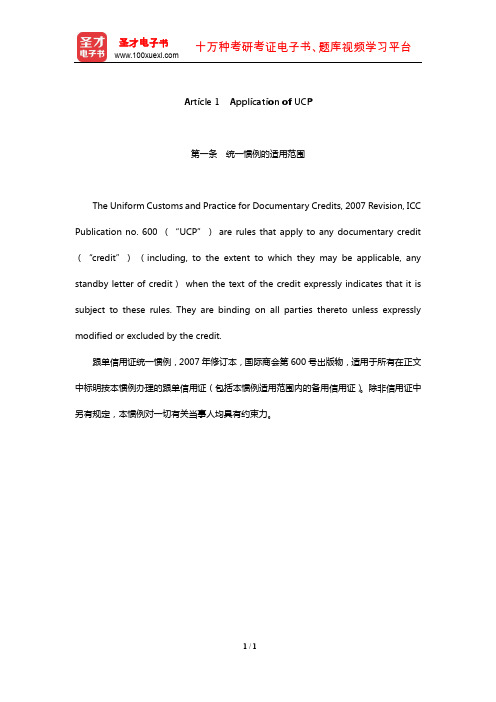
1 / 1
十万种考研考证电子书、题库视频学习平台
圣才电子书
Article 1 Application of UCP
第一条 统一惯例的适用范围
The Uniform Customs and Practice for Documentary Credits, 2007 Revision, ICC Publication no. 600 (“UCP”) are rules that apply to any documentary credit (“credit”) (including, to the extent to which they may be applicable, any standby letter of credit ) when the text of the credit expressly indicates that it is subject to these rules. They are binding on all parties thereto unless expressly modified or excluded by the credit.
跟单信用证统一惯例,2007年修订本,国际商会第600号出版物,适用于所有在正文中标明按本惯例办理的跟单信用证(包括本惯例适用范围内的备用信用证)。
除非信用证中另有规定,本惯例对一切有关当事人均具有约束力。
《跟单信用证统一惯例》(UCP600)中英文对照版

n第六条有效性、
有效期限及提
示A r地t i点c l e 7
4
Issuing Bank
Undertaking
第七条开证行
的承诺
Article 8
5 Confirming
Bank Undertaking 第八条保兑行 的承诺
Article 9
Advising of Credits and
1
Amendments
作者介绍
精彩摘录
这是《《跟单信用证统一惯例》(UCP600)中英文对照版》的读书笔记模板,可以替换为自己的精彩内容摘 录。
谢谢观看
Charter Party Bill
1
of Lading第
二十二条租船
合约提单
Article 23
Air Transport
2
Document第二
十三条空运单
据
Article 24
Road, Rail
or Inland
3 Waterway
Transport DA or ct ui mc el ne t s2 第5 二C o十u r四i e条r 公 路 、 铁R e路c e或i p内t 陆, 水 运PA ro单ts it据c l e 2 6
Article 20 Bill of Lading第二十
条提单
Article 19 Transport Document Covering at Least Two Different Modes
Article 21 Non-
Negotiable Sea Waybill第二十一 条非转让海运单
Article 22
4 R“eOcne iDpetc ko”r ,
《跟单信用证统一惯例》(UCP600)中英文对照版-Definitions【圣才出品】

Article 2 Definitions第二条定义For the purpose of these rules:就本惯例而言:Advising bank means the bank that advises the credit at the request of the issuing bank.通知行意指应开证行要求通知信用证的银行。
Applicant means the party on whose request the credit is issued.申请人意指发出开立信用证申请的一方。
Banking day means a day on which a bank is regularly open at the place at which an act subject to these rules is to be performed.银行日意指银行在其营业地正常营业,按照本惯例行事的行为得以在银行履行的日子。
Beneficiary means the party in whose favour a credit is issued.受益人意指信用证中受益的一方。
Complying presentation means a presentation that is in accordance with the terms and conditions of the credit, the applicable provisions of these rules and international standard banking practice.相符提示意指与信用证中的条款及条件、本惯例中所适用的规定及国际标准银行实务相一致的提示。
Confirmation means a definite undertaking of the confirming bank, in addition to that of the issuing bank, to honour or negotiate a complying presentation.保兑意指保兑行在开证行之外对于相符提示做出兑付或议付的确定承诺。
UCP600的中英文版下载
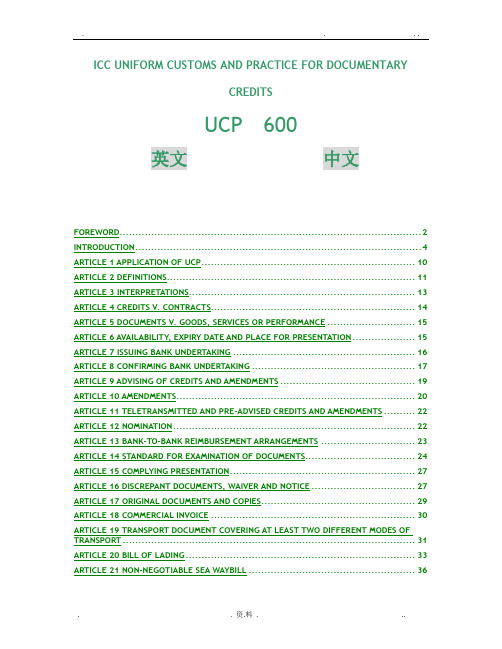
ICC UNIFORM CUSTOMS AND PRACTICE FOR DOCUMENTARYCREDITSUCP 600英文中文FOREWORD (2)INTRODUCTION (4)ARTICLE 1 APPLICATION OF UCP (10)ARTICLE 2 DEFINITIONS (11)ARTICLE 3 INTERPRETATIONS (13)ARTICLE 4 CREDITS V. CONTRACTS (14)ARTICLE 5 DOCUMENTS V. GOODS, SERVICES OR PERFORMANCE (15)ARTICLE 6 AVAILABILITY, EXPIRY DATE AND PLACE FOR PRESENTATION (15)ARTICLE 7 ISSUING BANK UNDERTAKING (16)ARTICLE 8 CONFIRMING BANK UNDERTAKING (17)ARTICLE 9 ADVISING OF CREDITS AND AMENDMENTS (19)ARTICLE 10 AMENDMENTS (20)ARTICLE 11 TELETRANSMITTED AND PRE-ADVISED CREDITS AND AMENDMENTS (22)ARTICLE 12 NOMINATION (22)ARTICLE 13 BANK-TO-BANK REIMBURSEMENT ARRANGEMENTS (23)ARTICLE 14 STANDARD FOR EXAMINATION OF DOCUMENTS (24)ARTICLE 15 COMPLYING PRESENTATION (27)ARTICLE 16 DISCREPANT DOCUMENTS, WAIVER AND NOTICE (27)ARTICLE 17 ORIGINAL DOCUMENTS AND COPIES (29)ARTICLE 18 COMMERCIAL INVOICE (30)ARTICLE 19 TRANSPORT DOCUMENT COVERING AT LEAST TWO DIFFERENT MODES OF TRANSPORT (31)ARTICLE 20 BILL OF LADING (33)ARTICLE 21 NON-NEGOTIABLE SEA WAYBILL (36)ARTICLE 22 CHARTER PARTY BILL OF LADING (38)ARTICLE 23 AIR TRANSPORT DOCUMENT (40)ARTICLE 24 ROAD, RAIL OR INLAND WATERWAY TRANSPORT DOCUMENTS (41)ARTICLE 25 COURIER RECEIPT, POST RECEIPT OR CERTIFICATE OF POSTING (44)ARTICLE 26 "ON DECK", "SHIPPER'S LOAD AND COUN T", “SAID BY SHIPPER TO CONTAIN”AND CHARGES ADDITIONAL TO FREIGHT (44)ARTICLE 27 CLEAN TRANSPORT DOCUMENT (45)ARTICLE 28 INSURANCE DOCUMENT AND COVERAGE (45)ARTICLE 29 EXTENSION OF EXPIRY DATE OR LAST DAY FOR PRESENTATION (47)ARTICLE 30 TOLERANCE IN CREDIT AMOUNT, QUANTITY AND UNIT PRICES (48)ARTICLE 31 PARTIAL DRAWINGS OR SHIPMENTS (49)ARTICLE 32 INSTALMENT DRAWINGS OR SHIPMENTS (50)ARTICLE 33 HOURS OF PRESENTATION (50)ARTICLE 34 DISCLAIMER ON EFFECTIVENESS OF DOCUMENTS (50)ARTICLE 35 DISCLAIMER ON TRANSMISSION AND TRANSLATION (51)ARTICLE 36 FORCE MAJEURE (52)ARTICLE 37 DISCLAIMER FOR ACTS OF AN INSTRUCTED PARTY (52)ARTICLE 38 TRANSFERABLE CREDITS (53)ARTICLE 39 ASSIGNMENT OF PROCEEDS (56)UCP600中文版UCP600第一条UCP的适用范围 (59)第二条定义 (59)第三条解释 (60)第四条信用证与合同 (61)第五条单据与货物、服务或履约行为 (61)第六条兑用方式、截止日和交单地点 (61)第七条开证行责任 (62)第八条保兑行责任 (62)第九条信用证及其修改的通知 (63)第十条修改 (63)第十一条电讯传输的和预先通知的信用证和修改 (64)第十二条指定 (64)第十三条银行之间的偿付安排 (64)第十四条单据审核标准 (64)第十五条相符交单 (65)第十六条不符单据、放弃及通知 (66)第十七条正本单据及副本 (66)第十八条商业发票 (67)第十九条涵盖至少两种不同运输方式的运输单据 (67)第二十条提单 (68)第二十一条不可转让的海运单 (69)第二十二条租船合同提单 (70)第二十三条空运单据 (70)第二十四条公路、铁路或内陆水运单据 (71)第二十五条快递收据、邮政收据或投邮证明 (72)第二十六条“货装舱面”、“托运人装载和计数”、“内容据托运人报称”及运费之外的费用。
UCP600(中英文)

《跟单信用证统一惯例》1(UCP600)(ICC Uniform Customs and Practice for Documentary Credits)Article 1 Application of UCPThe Uniform Customs and Practice for Documentary Credits, 2007 Revision, ICC Publication no. 600 (“UCP”) are rules that apply to any documentary credit (“credit”) (including, to the extent to which they may be applicable, any standby letter of credit) when the text of the credit expressly indicates that it is subject to these rules. They are binding on all parties thereto unless expressly modified or excluded by the credit.第1条UCP的适用范围《跟单信用证统一惯例》(2007年修订版,国际商会第600号出版物,简称“UCP”)在信用证条文明确表明其将受该规则约束的情况下,适用于所有跟单信用证(以下称“信用证”)(在其可适用的范围内,包括备用信用证)。
除非信用证明确地修改或排除,本规则对信用证所有各有关方均有约束力。
Article 2 DefinitionsFor the purpose of these rules:Advising bank means the bank that advises the credit at the request of the issuing bank.Applicant means the party on whose request the credit is issued.Banking day means a day on which a bank is regularly open at the place at which an act subject to these rules is to be performed.Beneficiary means the party in whose favour a credit is issued.Complying presentation means a presentation that is in accordance with the terms and conditions of the credit, the applicable provisions of these rules and international standard banking practice. Confirmation means a definite undertaking of the confirming bank, in addition to that of the issuing bank, to honour or negotiate a complying presentation.Confirming bank means the bank that adds its confirmation to a credit upon the issuing bank’s authorization or request.Credit means any arrangement, however named or described, that is irrevocable and thereby constitutes a definite undertaking of the issuing bank to honour a complying presentation.Honour means:a. to pay at sight if the credit is available by sight payment.b. to incur a deferred payment undertaking and pay at maturity if the credit is available by deferred payment.c. to accept a bill of exchange (“draft”) drawn by the beneficiary and pa y at maturity if the credit is available by acceptance.Issuing bank means the bank that issues a credit at the request of an applicant or on its own behalf. Negotiation means the purchase by the nominated bank of drafts (drawn on a bank other than the nominated bank) and/or documents under a complying presentation, by advancing or agreeing to advance funds to the beneficiary on or before the banking day on which reimbursement is due to the nominated bank.Nominated bank means the bank with which the credit is available or any bank in the case of a credit available with any bank.Presentation means either the delivery of documents under a credit to the issuing bank or nominated bank or the documents so delivered.Presenter means a beneficiary, bank or other party that makes a presentation.第2条定义1本中译本由姚新超根据UCP600英文版整理而成,并非正式译文,仅供学习和参考之用。
最新ucp600中英文对照及解读(共117页)

4.第7条C款、第12条b款在强调开证行对承兑信用证下的承兑行、延期付款(fù kuǎn)信用证下的付款行的付款责任时,明确规定“指定(zhǐdìng)”即等于授权该承兑行、该延期付款(fù kuǎn)行分别可以预付已承兑但未到期的汇票、先期实现(purchase)对受益人的付款承诺。也就是授权指定银行可不经由第三家银行直接贴现于受益人,实现两利。只要做到complyingpresentation,开证行应在到期日予以偿付。
8.第14条c款交单不迟于装运日后21天乃明确为21个日历日。第14条j款:各运输单据上收货人栏或通知人栏内关于开证申请人地址和联系细节必须与信用证相同。第31条b款中有规定,一票货物以两个或更多运输工具同时装运出发也视为分批。
9.第14条L款,在符合各运输单据条款规定的条件下,运输单据 可由任何人出具(chū jù),应指各运输代理人、直接以承运人身份签发运输单 据的运输行(forwarder)及可能是被“承运人”这一概念(gàiniàn)同样吸收了的“多式运输(yùnshū)经营人”。
要注意的是,新条款虽为39条,但业界要比照阅读的条款实际却大大增加了,那就是ISBP约200条。UCP600第14条d款明确规定对照解读单据中的数据内容(data)时除了具体信用证、单据本身外还有ISBP。与UCP600匹配的新的ISBP条款正在修订之中。UCP调整开证行、保兑行(如有)与申请人、受益人及各指定银行间的单据交易和债权债务清偿关系,而ISBP规范的是银行根据什么标准来审核受益人提交的单据,其内容不能穷尽却很详尽。要指出的是,UCP500的精神是“单证相符、单单不得互不一致”,而UCP600的精神根据第14条d款,即使在单证之间也不要求“等同”(identical),仅要求“不得矛盾” (mustnotconflictwith),这样比过去单单之间“不得互不一致”( notinconsistentwith)的说法更体现了审单标准宽松化的倾向。当然该条款并不表明审单放弃了“相符”的原则。有一例很能说明问题: ISBP(ICC第645号出版物)第28条举例,将“model”写成“modle” 不应视为不符,而将“model321”写成“modle123”则为不符。过去银行根据所谓“严格相符”的原则大量退单,从而成为导致信用证业务萎缩的原因之一。在这个意义上说ICC修改UCP及制定ISBP,其原因之一是在拯救信用证业务。
《跟单信用证统一惯例》UCP600中英文对照版
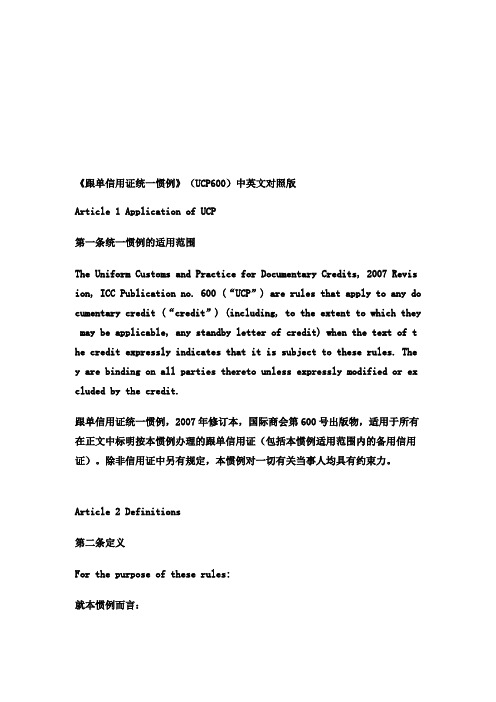
《跟单信用证统一惯例》(UCP600)中英文对照版Article 1 Application of UCP第一条统一惯例的适用范围The Uniform Customs and Practice for Documentary Credits, 2007 Revis ion, ICC Publication no. 600 (“UCP”) are rules that apply to any do cumentary credit (“credit”) (including, to the extent to which they may be applicable, any standby letter of credit) when the text of t he credit expressly indicates that it is subject to these rules. The y are binding on all parties thereto unless expressly modified or ex cluded by the credit.跟单信用证统一惯例,2007年修订本,国际商会第600号出版物,适用于所有在正文中标明按本惯例办理的跟单信用证(包括本惯例适用范围内的备用信用证)。
除非信用证中另有规定,本惯例对一切有关当事人均具有约束力。
Article 2 Definitions第二条定义For the purpose of these rules:就本惯例而言:Advising bank means the bank that advises the credit at the request of the issuing bank.通知行意指应开证行要求通知信用证的银行。
Applicant means the party on whose request the credit is issued.申请人意指发出开立信用证申请的一方。
- 1、下载文档前请自行甄别文档内容的完整性,平台不提供额外的编辑、内容补充、找答案等附加服务。
- 2、"仅部分预览"的文档,不可在线预览部分如存在完整性等问题,可反馈申请退款(可完整预览的文档不适用该条件!)。
- 3、如文档侵犯您的权益,请联系客服反馈,我们会尽快为您处理(人工客服工作时间:9:00-18:30)。
ICC UNIFORM CUSTOMS AND PRACTICE FOR DOCUMENTARYCREDITSUCP 600英文中文FOREWORD (2)INTRODUCTION (4)ARTICLE 1 APPLICATION OF UCP (10)ARTICLE 2 DEFINITIONS (11)ARTICLE 3 INTERPRETATIONS (13)ARTICLE 4 CREDITS V. CONTRACTS (14)ARTICLE 5 DOCUMENTS V. GOODS, SERVICES OR PERFORMANCE (15)ARTICLE 6 AVAILABILITY, EXPIRY DATE AND PLACE FOR PRESENTATION (15)ARTICLE 7 ISSUING BANK UNDERTAKING (16)ARTICLE 8 CONFIRMING BANK UNDERTAKING (17)ARTICLE 9 ADVISING OF CREDITS AND AMENDMENTS (19)ARTICLE 10 AMENDMENTS (20)ARTICLE 11 TELETRANSMITTED AND PRE-ADVISED CREDITS AND AMENDMENTS (22)ARTICLE 12 NOMINATION (22)ARTICLE 13 BANK-TO-BANK REIMBURSEMENT ARRANGEMENTS (23)ARTICLE 14 STANDARD FOR EXAMINATION OF DOCUMENTS (24)ARTICLE 15 COMPLYING PRESENTATION (27)ARTICLE 16 DISCREPANT DOCUMENTS, WAIVER AND NOTICE (27)ARTICLE 17 ORIGINAL DOCUMENTS AND COPIES (29)ARTICLE 18 COMMERCIAL INVOICE (30)ARTICLE 19 TRANSPORT DOCUMENT COVERING AT LEAST TWO DIFFERENT MODES OF TRANSPORT (31)ARTICLE 20 BILL OF LADING (33)ARTICLE 21 NON-NEGOTIABLE SEA WAYBILL (36)ARTICLE 22 CHARTER PARTY BILL OF LADING (38)ARTICLE 23 AIR TRANSPORT DOCUMENT (40)ARTICLE 24 ROAD, RAIL OR INLAND WATERWAY TRANSPORT DOCUMENTS (41)ARTICLE 25 COURIER RECEIPT, POST RECEIPT OR CERTIFICATE OF POSTING (44)ARTICLE 26 "ON DECK", "SHIPPER'S LOAD AND COUN T", “SAID BY SHIPPER TO CONTAIN”AND CHARGES ADDITIONAL TO FREIGHT (44)ARTICLE 27 CLEAN TRANSPORT DOCUMENT (45)ARTICLE 28 INSURANCE DOCUMENT AND COVERAGE (45)ARTICLE 29 EXTENSION OF EXPIRY DATE OR LAST DAY FOR PRESENTATION (47)ARTICLE 30 TOLERANCE IN CREDIT AMOUNT, QUANTITY AND UNIT PRICES (48)ARTICLE 31 PARTIAL DRAWINGS OR SHIPMENTS (49)ARTICLE 32 INSTALMENT DRAWINGS OR SHIPMENTS (50)ARTICLE 33 HOURS OF PRESENTATION (50)ARTICLE 34 DISCLAIMER ON EFFECTIVENESS OF DOCUMENTS (50)ARTICLE 35 DISCLAIMER ON TRANSMISSION AND TRANSLATION (51)ARTICLE 36 FORCE MAJEURE (52)ARTICLE 37 DISCLAIMER FOR ACTS OF AN INSTRUCTED PARTY (52)ARTICLE 38 TRANSFERABLE CREDITS (53)ARTICLE 39 ASSIGNMENT OF PROCEEDS (56)UCP600中文版UCP600第一条UCP的适用范围 (59)第二条定义 (59)第三条解释 (60)第四条信用证与合同 (61)第五条单据与货物、服务或履约行为 (61)第六条兑用方式、截止日和交单地点 (61)第七条开证行责任 (62)第八条保兑行责任 (62)第九条信用证及其修改的通知 (63)第十条修改 (63)第十一条电讯传输的和预先通知的信用证和修改 (64)第十二条指定 (64)第十三条银行之间的偿付安排 (64)第十四条单据审核标准 (64)第十五条相符交单 (65)第十六条不符单据、放弃及通知 (66)第十七条正本单据及副本 (66)第十八条商业发票 (67)第十九条涵盖至少两种不同运输方式的运输单据 (67)第二十条提单 (68)第二十一条不可转让的海运单 (69)第二十二条租船合同提单 (70)第二十三条空运单据 (70)第二十四条公路、铁路或内陆水运单据 (71)第二十五条快递收据、邮政收据或投邮证明 (72)第二十六条“货装舱面”、“托运人装载和计数”、“内容据托运人报称”及运费之外的费用。
(72)第二十七条清洁运输单据 (72)第二十八条保险单据及保险范围 (72)第二十九条截止日或最迟交单日的顺延 (73)第三十条信用证金额、数量与单价的伸缩度 (73)第三十一条部分支款或部分发运 (73)第三十二条分期支款或分期发运 (74)第三十三条交单时间 (74)第三十四条关于单据有效性的免责 (74)第三十五条关于信息传递和翻译的免责 (74)第三十六条不可抗力 (74)第三十七条关于被指示方行为的免责 (75)第三十八条可转让信用证 (75)第三十九条款项让渡 (76)FOREWORDThis revision of the Uniform Customs and Practice for Documentary Credits (c ommonly called “UCP”) is the sixth revision of the rules since they were first promulgated in 1933.It is the fruit of more than three years of work by the International Chamber of Commerce’s (ICC) Commission on Banking Technique and Practice.ICC, which was established in 1919, had as its primary objective facilitating the flow of international trade at a time when nationalism and protectionism posed serious threats to the world trading system. It was in that spirit that the UCP were first introduced – to alleviate the confusion caused by individual countries’ promoting their own national rules on letter of credit practice. The objective, since attained, was to create a set of contractual rules that would establish uniformity in that practice, so that practitioners would not have to cope with a plethora of often conflicting national regulations. The universal acceptance of the UCP by practitioners in countries with widely divergent economic and judicial systems is a testament to the rules’ success.It is important to recall that the UCP represent the work of a private international organization, not a governmental body. Sinceits inception, ICC has insisted on the central role of self-regulation in business practice. These rules, formulated entirely by experts in the private sector, have validated that approach. The UCP remain the most successful set of private rules for trade ever developed.A range of individuals and groups contributed to the current revision, which is entitled UCP 600. These include the UCP Drafting Group, which sifted through more than 5000 individual comments before arriving at this consensus text; the UCP ConsultingGroup,consisting of members from more than 25 countries, which served as the advisory body reacting to and proposing changes to the various drafts; the more than 400 members ofthe ICC Commission on Banking Technique and Practice who made ertinentsuggestions for changes in the text; and ICC national committees worldwide which took an active role in consolidating comments from their members. ICC also expresses its gratitude to practitioners in the transport andInsurance industries, whose perceptive suggestions honed the final draft.Guy SebbanSecretary GeneralInternational Chamber of CommerceINTRODUCTIONIn May 2003, the International Chamber of Commerce authorized the ICC Commission on Banking Technique and Practice (Banking Commission) to begin a revision of the Uniform Customs and Practice for Documentary Credits, ICC Publication 500.As with other revisions, the general objective was to address developments in the banking, transport and insurance industries. Additionally, there was a need to look at the language and style used in the UCP to remove wording that could lead to inconsistent application and interpretation.When work on the revision started, a number of global surveys indicated that, because of discrepancies, approximately 70% of documents presented under letters of credit were being rejected on first presentation. This obviously had, and continues to have, a negative effect on the letter of credit being seen as a means of payment and, if unchecked, could have serious implications formaintaining or increasing its market share as a recognized means of settlement in international trade. The introduction by banks of a discrepancy fee has highlighted the importance of this issue, especially when the underlying discrepancies have been found to be dubious or unsound. Whilst the number of cases involving litigation has not grown during the lifetime of UCP 500, the introduction of the ICC’s Documentary Credit Dispute Resolution Expertise Rules (DOCDEX) in October 1997 (subsequently revised in March 2002) has resulted in more than 60 cases being decided.To address these and other concerns, the Banking Commission established a Drafting Group to revise UCP 500. It was also decided to create a second group, known as the Consulting Group, to review and advise on early drafts submitted by the Drafting Group.The Consulting Group, made up of over 40 individuals from 26 countries, consisted of banking and transport industry experts. Ably co-chaired by John Turnbull, Deputy General Manager, Sumitomo Mitsui Banking Corporation Europe Ltd, London and CarloDi Ninni, Adviser, Italian Bankers Association, Rome, the Consulting Group provided valuable input to the Drafting Group prior to release of draft texts to ICC national committees.The Drafting Group beganthe review process by analyzing the content of the official Opinions issued by the Banking Commission under UCP 500. Some 500 Opinions were reviewed to assess whether the issues involved warranted a change in, an addition to or a deletion of any UCP article. In addition, consideration was given to the content of thefour Position Papers issued by the Commission in September 1994, the two Decisions issued by the Commission (concerning the introduction of the euro and the determination of what constituted an original document under UCP 500 sub-article 20(b) and the decisions issued in DOCDEX cases. During the revision process, notice was taken of the considerable work that had been completed in creating the International Standard Banking Practice for the Examination of Documents under Documentary Credits (ISBP), ICC Publication 645. This publicationhas evolved into a necessary companion to the UCP for determining compliance of documents with the terms of letters of credit. It is the expectation of the Drafting Group and the Banking Commission that the application of the principles contained in the ISBP, including subsequent revisions thereof, will continue during the time UCP 600 is in force. At the time UCP 600 is implemented, there will be anupdated version of theISBP to bring its contents in line with the substance and style of the new rules. The four Position Papers issued in September 1994 were issued subject to their application under UCP 500; therefore, they will not be applicable under UCP 600. The essence of the Decision covering the determination of an original document has been incorporated into the text of UCP 600. The outcome of the DOCDEX cases were invariably based on existing ICC Banking Commission Opinions and therefore contained no specific issues that required addressing in these rules.One of the structural changes to the UCP is the introduction of articles covering definitions (article 2) and interpretations (article 3). In providing definitions of rolesplayed by banks and the meaning of specific terms and events, UCP 600 avoids the necessity of repetitive text to explain their interpretation and application. Similarly, the article covering interpretations aims to take the ambiguity out of vague or unclear language that appears in letters of credit and to provide a definitive elucidation of other characteristics of the UCP or the credit. During the course of the last three years, ICC national committees were canvassed on a range of issues to determine their preferences onalternative texts submitted by the Drafting Group. The results of this exercise and the considerable input from national committees on individual items in the text is reflected in the content of UCP 600. The Drafting Group considered, not only the current practice relative to the documentary credit, but also tried to envisage the future evolution of that practice.This revision of the UCP represents the culmination of over three years of extensive analysis, review, debate and compromise amongst the various members of the Drafting Group, the members of the Banking Commission and the respective ICC national committees. Valuable comment has also been received from the ICC Commission on Transport and Logistics, the Commission on Commercial Law and Practice and the Committee on Insurance.It is not appropriate for this publication to provide an explanation as to why an article has been worded in such a way or what is intended by its incorporation into the rules.For those interested in understanding the rationale and interpretation of the articles of UCP 600, this information will be found in the Commentary to the rules, ICC Publication 601, which represents the Drafting Group’s views.On behalf of the Drafting Group I would like to extend our deep appreciation to the members of the Consulting Group, ICC nationalcommittees and members of the Banking Commission for their professional comments and their constructive participation in this process. Special thanks are due to the members of the Drafting Group and their institutions, who are listed below in alphabetical order.Nicole Keller – Vice President, Service International Products, Dresdner Bank AG,Frankfurt, Germany; Representative to the ICC Commission on Banking Technique and Practice;Laurence Kooy –Legal Adviser, BNP Paribas, Paris, France; Representative to the ICC Commission on Banking Technique and Practice.Katja Lehr – Business Manager, Trade Services Standards, SWIFT, La Hulpe, Belgium,then Vice President, Membership Representation, International Financial Services Association, New Jersey, USA; Representative to the ICC Commission on Banking Technique and Practice;Ole Malmqvist – Vice President, Danske Bank, Copenhagen, Denmark; Representative to the ICC Commission on Banking Technique and Practice;Paul Miserez – Head of Trade Finance Standards, SWIFT, La Hulpe, Belgium;Representative to the ICC Commission on Banking Technique and Practice;René Mueller – Director, Credit Suisse, Zurich,Switzerland; Representative to the ICCCommission on Banking Technique and Practice;Chee Seng Soh – Consultant, Association of Banks in Singapore, Singapore;Representative to the ICC Commission on Banking Technique and Practice;Dan Taylor – President and CEO, International Financial Services Association., New Jersey USA; Vice Chairman, ICC Commission on Banking Technique and Practice;Alexander Zelenov – Director, Vnesheconombank, Moscow, Russia; Vice Chairman,ICC Commission on Banking Technique and Practice;Ron Katz – Policy Manager, ICC Commission on Banking Technique and Practice,International Chamber of Commerce, Paris, France.The undersigned had the pleasure of chairing the Drafting Group.It was through the generous giving of their knowledge, time and energy that this revision was accomplished so successfully. As Chair of the Drafting Group, I would like to extend to them and to their institutions my gratitude for their contribution, for a job well done and for their friendship. I would also like to extend my sincere thanks to themanagement of ABN AMRO Bank N.V., for their understanding,patience and support during the course of this revision process.Gary CollyerCorporate Director,ABN AMRO Bank N.V., London, England and Technical Adviser to the ICC Commission on Banking Technique and PracticeNovember 2006Article 1 Application of UCPThe Uniform Customs and Practice for Documentary Credits, 2007 Revision, ICC Publication no. 600 (“UCP”) are rules that apply to any doc umentary credit (“credit”) (including, to the extent to which they may be applicable, any standby letter of credit) when the text of the credit expressly indicates that it is subject to these rules. They are binding on all parties thereto unless expressly modified or excluded by the credit.Article 2 DefinitionsFor the purpose of these rules:Advising bank means the bank that advises the credit at the request of the issuing bank.Applicant means the party on whose request the credit is issued.Banking day means a day on which a bank is regularly open at the place at which an act subject to these rules is to be performed. Beneficiary means the party in whose favour a credit is issued. Complying presentation means a presentation that is in accordance with the terms and conditions of the credit, the applicable provisions of these rules and international standard banking practice. Confirmation means a definite undertaking of the confirming bank, in addition to that of the issuing bank, to honour or negotiate a complying presentation.Confirming bank means the bank that adds its confirmation to a credit upon the issuing bank’s authorization or request.Credit means any arrangement, however named or described, that is irrevocable and thereby constitutes a definite undertaking of the issuing bank to honour a complying presentation.Honour means:a. to pay at sight if the credit is available by sight payment.b. to incur a deferred payment undertaking and pay at maturity if the credit is available by deferred payment.c. to accept a bill of exchange (“draft”) drawn by the beneficiary and pay atmaturity if the credit is available by acceptance.Issuing bank means the bank that issues a credit at the request of an applicant or on its own behalf.Negotiation means the purchase by the nominated bank of drafts (drawn on a bank other than the nominated bank) and/or documents under a complying presentation, by advancing or agreeing to advance funds to the beneficiary on or before the banking day on which reimbursement is due to the nominated bank.Nominated bank means the bank with which the credit is available or any bank in the case of a credit available with any bank. Presentation means either the delivery of documents under a credit to the issuing bank or nominated bank or the documents so delivered.Presenter means a beneficiary, bank or other party that makes a presentation.Article 3 InterpretationsFor the purpose of these rules:Where applicable, words in the singular include the plural and in the plural include the singular.A credit is irrevocable even if there is no indication to that effect.A document may be signed by handwriting, facsimile signature, perforated signature,stamp, symbol or any other mechanical or electronic method of authentication.A requirement for a document to be legalized, visaed, certified or similar will be satisfied by any signature, mark, stamp or label on the document which appears to satisfy that requirement.Branches of a bank in different countries are considered to be separate banks.Terms such as "first class", "well known", "qualified", "independent", "official","competent" or "local" used to describe the issuer of a document allow any issuer except the beneficiary to issue that document.Unless required to be used in a document, words such as "prompt", "immediately" or "as soon as possible" will be disregarded.The expression "on or about" or similar will be interpreted as a stipulation that an event is to occur during a period of five calendar days before until five calendar days after the specified date, both start and end dates included.The words "to", "until", "till", “from” and “between” when used todetermine a period of shipment include the date or dates mentioned, and the words “before” and "after"exclude the date mentioned.The words “from” and "after" when used to determine a maturity date exclude the date mentioned.The terms "first half" and "second half" of a month shall be construed respectively as the 1st to the 15th and the 16th to the last day of the month, all dates inclusive.The terms "beginning", "middle" and "end" of a month shall be construed respectively as the 1st to the 10th, the 11th to the 20th and the 21st to the last day of the month, all dates inclusive.Article 4 Credits v. Contractsa. A credit by its nature is a separate transaction from the sale or other contract on which it may be based. Banks are in no way concerned with or bound by such contract, even if any reference whatsoever to it is included in the credit.Consequently, the undertaking of a bank to honour, to negotiate or to fulfil any other obligation under the credit is not subject to claims or defences by the applicant resulting from its relationships with the issuing bank or the beneficiary.A beneficiary can in no case avail itself of thecontractual relationships existing between banks or between the applicant and the issuing bank.b. An issuing bank should discourage any attempt by the applicant to include, as an integral part of the credit, copies of the underlying contract, proforma invoice and the like.Article 5 Documents v. Goods, Services or PerformanceBanks deal with documents and not with goods, services or performance to which the documents may relate.Article 6 Availability, Expiry Date and Place for Presentationa. A credit must state the bank with which it is available or whether it is available with any bank. A credit available with a nominated bank is also available with the issuing bank.b. A credit must state whether it is available by sight payment, deferred payment,acceptance or negotiation.c. A credit must not be issued available by a draft drawn on the applicant.d. i. A credit must state an expiry date for presentation. An expiry datestated for honour or negotiation will be deemed to be an expiry date forpresentation.ii. The place of the bank with which the credit is available is the place forpresentation. The place for presentation under a credit available with anybank is that of any bank. A place for presentation other than that of theissuing bank is in addition to the place of the issuing bank.e. Except as provided in sub-article 29 (a), a presentation by or on behalf of the beneficiary must be made on or before the expiry date.Article 7 Issuing Bank Undertakinga. Provided that the stipulated documents are presented to the nominated bank or to the issuing bank and that they constitute a complying presentation, the issuing bank must honour if the credit is available by:i. sight payment, deferred payment or acceptance with the issuing bank;ii. sight payment with a nominated bank and that nominated bank does not pay;iii. deferred payment with a nominated bank and that nominated bank does not incur its deferred payment undertaking or, having incurred its deferred payment undertaking, does not pay at maturity; iv. acceptance with a nominated bank and that nominated bank does not accept a draft drawn on it or, having accepted a draft drawn on it, does not pay at maturity;v. negotiation with a nominated bank and that nominated bank does not negotiate.b. An issuing bank is irrevocably bound to honour as of the time it issues the credit.c. An issuing bank undertakes to reimburse a nominated bank that has honoured or negotiated a complying presentation and forwarded the documents to the issuing bank. Reimbursement for the amount of a complying presentation under a credit available by acceptance or deferred payment is due at maturity, whether or not the nominated bank prepaid or purchased before maturity. An issuing bank's undertaking to reimburse a nominated bank is independent of the issuing bank’s undertaking to the beneficiary.Article 8 Confirming Bank Undertakinga. Provided that the stipulated documents are presented to the confirming bank or to any other nominated bank and that they constitute a complying presentation,the confirming bank must:i. honour, if the credit is available bya. sight payment, deferred payment or acceptance with the confirming bank;b. sight payment with another nominated bank and that nominated bank does not pay;c. deferred payment with another nominated bank and that nominated bank does not incur its deferred payment undertaking or, having incurred its deferred payment undertaking, does not pay at maturity;d. acceptance with another nominated bank and that nominated bank does not accept a draft drawn on it or, having accepted a draft drawn on it, does not pay at maturity;e. negotiation with another nominated bank and that nominated bank does not negotiate.ii. negotiate, without recourse, if the credit is available bynegotiation with the confirming bank.b. A confirming bank is irrevocably bound to honour or negotiate as of the time it adds its confirmation to the credit.c. A confirming bank undertakes to reimburse another nominated bank that has honoured or negotiated a complying presentation and forwarded the documents to the confirming bank. Reimbursement for the amount of a complying presentation under a credit available by acceptance or deferred payment is due at maturity, whether or not another nominated bank prepaid or purchased before maturity. A confirming bank's undertaking to reimburse another nominated bank is independent of the confirming bank’s Undertaking to the beneficiary.d. If a bank is authorized or requested by the issuing bank to confirm a credit but is not prepared to do so, it must inform the issuing bank without delay and may advise the credit without confirmation.Article 9 Advising of Credits and Amendmentsa. A credit and any amendment may be advised to a beneficiary through anadvising bank. An advising bank that is not a confirming bank advisesthe credit and any amendment without any undertaking to honour or negotiate.b. By advising the credit or amendment, the advising bank signifies that it has satisfied itself as to the apparent authenticity of the credit or amendment and that the advice accurately reflects the terms and conditions of the credit or amendment received.c. An advising bank may utilize the services of another bank (“second advising bank”) to advise the credit and any amendment to the beneficiary. By advising the credit or amendment, the second advising bank signifies that it has satisfied itself as to the apparent authenticity of the advice it has received and that the advice accurately reflects the terms and conditions of the credit or amendment received.d. A bank utilizing the services of an advising bank or second advising bank to advise a credit must use the same bank to advise any amendment thereto.e. If a bank is requested to advise a credit or amendment but elects not to do so, it must so inform, without delay, the bank from which the credit, amendment or advice has been received.f. If a bank is requested to advise a credit or amendment but cannotsatisfy itself as to the apparent authenticity of the credit, the amendment or the advice, it must so inform, without delay, the bank from which the instructions appear to have been received. If the advising bank or second advising bank elects nonetheless to advise the credit or amendment, it must inform the beneficiary or second advising bank that it has not been able to satisfy itself as to the apparent authenticity of the credit, the amendment or the advice.Article 10 Amendmentsa. Except as otherwise provided by article 38, a credit can neither be amended nor cancelled without the agreement of the issuing bank, the confirming bank, if any,and the beneficiary.b. An issuing bank is irrevocably bound by an amendment as of the time it issues the amendment. A confirming bank may extend its confirmation to anamendment and will be irrevocably bound as of the time it advises theamendment. A confirming bank may, however, choose to advise an amendment without extending its confirmation and, if so, it must inform the issuing bank without delay and inform the beneficiary inits advice.c. The terms and conditions of the original credit (or a credit incorporatingpreviously accepted amendments) will remain in force for the beneficiary until the beneficiary communicates its acceptance of the amendment to the bank that advised such amendment. The beneficiary should give notification of acceptance or rejection of an amendment. If the beneficiary fails to give such notification, a presentation that complies with the credit and to any not yet accepted amendment will be deemed to be notification of acceptance by the beneficiary of such amendment. As of that moment the credit will be amended.d. A bank that advises an amendment should inform the bank from which itreceived the amendment of any notification of acceptance or rejection.e. Partial acceptance of an amendment is not allowed and will be deemed to be notification of rejection of the amendment.f. A provision in an amendment to the effect that the amendment shall enter into force unless rejected by the beneficiary within acertain time shall bedisregarded.Article 11 Teletransmitted and Pre-Advised Credits and Amendmentsa. An authenticated teletransmission of a credit or amendment will be deemed to be the operative credit or amendment, and any subsequent mail confirmation shall be disregarded.If a teletransmission states "full details to follow" (or words of similar effect), or states that the mail confirmation is to be the operative credit or amendment, then the teletransmission will not be deemed to be the operative credit or amendment.The issuing bank must then issue the operative credit or amendment without elay in terms not inconsistent with the teletransmission.b. A preliminary advice of the issuance of a credit or amendment (“pre-advice”) Shall only be sent if the issuing bank is prepared to issue the operative credit or amendment. An issuing bank that sends a pre-advice is irrevocably committed to issue the operative credit or amendment, without delay, in terms not inconsistent with thepre-advice.。
